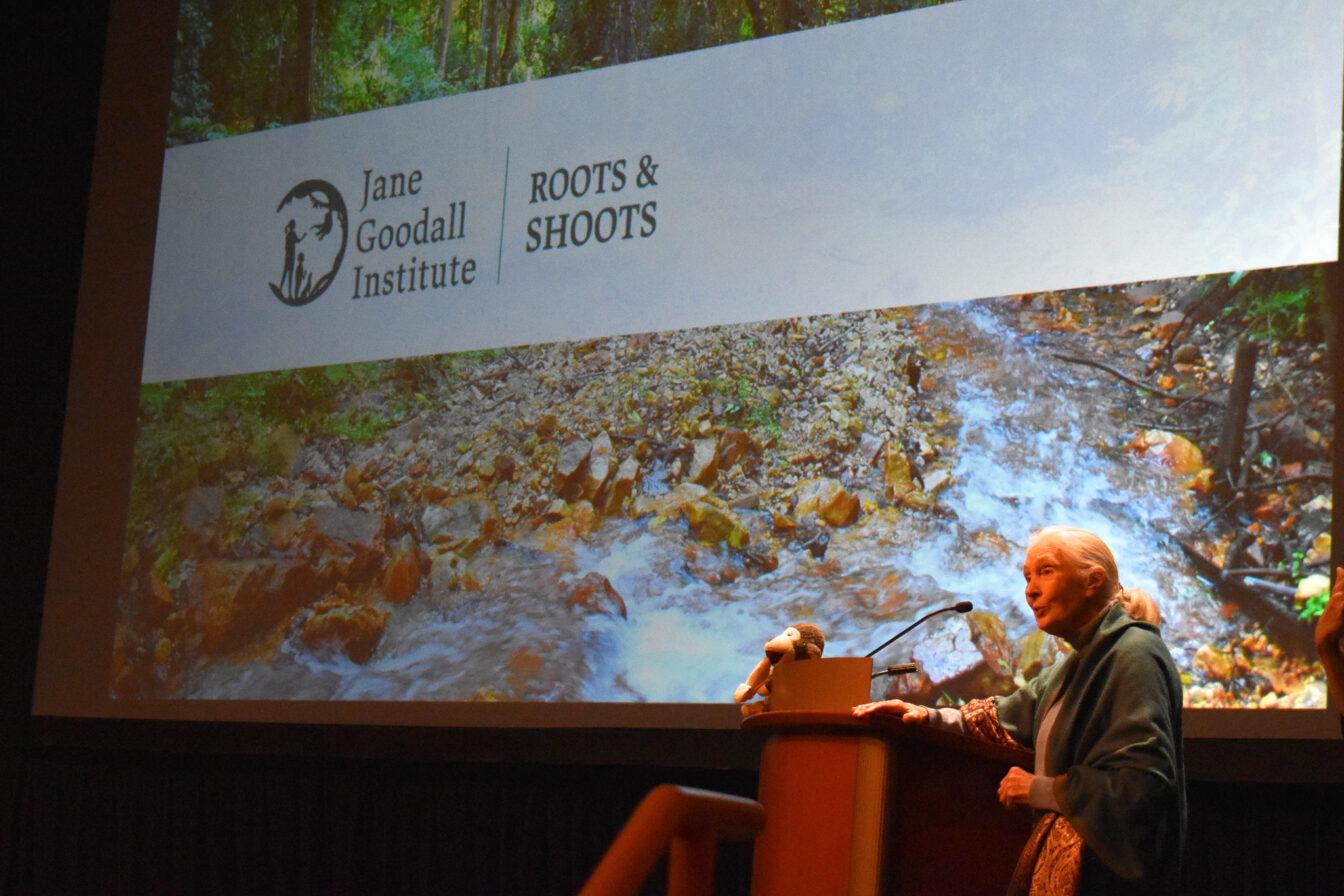Jane Goodall, world renowned ethologist and conservationist, lectured on the power of hope and her experiences as a field researcher and activist to University of Wisconsin students and Madison community members March 26.
The Wisconsin Union Directorate Distinguished Lecture Series organized the event, which took place in Memorial Union’s Shannon Hall at 7 p.m., though a live stream option was also available.
Goodall is known for her groundbreaking research on chimpanzee behavior in what is now Gombe Stream National Park, Tanzania. When Goodall discovered that chimpanzees make and use tools, her findings forever altered people’s understanding of primates and humans’ place in the animal kingdom. That project is now the longest running wild chimpanzee research project in the world, according to the Jane Goodall Institute.
During the lecture, Goodall recounted her journey to Tanzania, where she conducted field research, and her transition into activism.
Goodall said early in the lecture that she finds it hard to believe that she’s become an icon, and she finds it difficult to keep up with that image.
“As long as you know that I’m just me, that’s fine,” Goodall said. “Not the icon that’s talking to you, it’s me.”
Goodall was 10 years old when she read “Tarzan of the Apes.” While Goodall said she felt Tarzan married the wrong Jane, she decided she wanted to move to Africa, live with wild animals and write books.
Everyone else thought the idea of a girl moving to Africa was outrageous, but Goodall’s mother encouraged her.
“She said ‘Jane, if you really want to do something like this, you’ll have to work really hard. Take advantage of every opportunity, and if you don’t give up hope, you will find a way,'” Goodall said.
When she was 26 years old, Goodall moved to Tanzania to begin the first study of chimpanzees. Goodall said she was the “first person ever to study our closest living relatives” in the lecture. Her breakthrough finding came when she saw a chimpanzee using sticks as a tool to gather food. At the time, scientists thought that humans were the only species that use and construct tools.
Then in the late 1980s, Goodall was flying across Gombe and saw a shell of the former large equatorial forest belt out her window. The people living in the area were struggling to make a living, and Goodall said they were cutting down the forest and chimpanzee habitat to make farmland or to sell the wood.
“So that’s when it hit me,” Goodall said. “If we don’t help these people to find ways to survive without destroying the environment, we can’t save chimps, forests or anything else.”
Goodall then started the Tacare Approach to community-conservation. The Tacare Approach takes into account how conservation threats are associated with economic inequalities in the surrounding communities. Today, Goodall said 104 villages in Tanzania use the Tacare approach, and it’s present in six other countries.
When Goodall was traveling to raise awareness for the Tacare Approach, she noticed that many young people were hopeless about their future. She said that in many ways, older generations have stolen young peoples’ futures. So she founded “Roots and Shoots,” a program that helps young people find ways to make a difference in their communities by participating in projects that help the environment, people and animals.
This spring 2023 tour is her first in-person tour since 2019, according to a press release from WUD.
In a press interview, Goodall said the in-person tour is less tiring than her remote lectures in the past three years when she was doing up to four zoom calls every day, even on Christmas.
“The good thing about being back on the road is having a live audience because giving a lecture to a little green dot on a screen, that’s difficult,” Goodall said. “But you have to give it all your energy and enthusiasm, otherwise it’s not worth doing.”
Despite all the negative news about climate change and the environment, Goodall said she finds hope in people working on innovative projects and witnessing the resilience of nature.
“If I go speak, the tickets are sold out in record time,” Goodall said. “It’s because I talk about hope. People want to hear about hope.”


